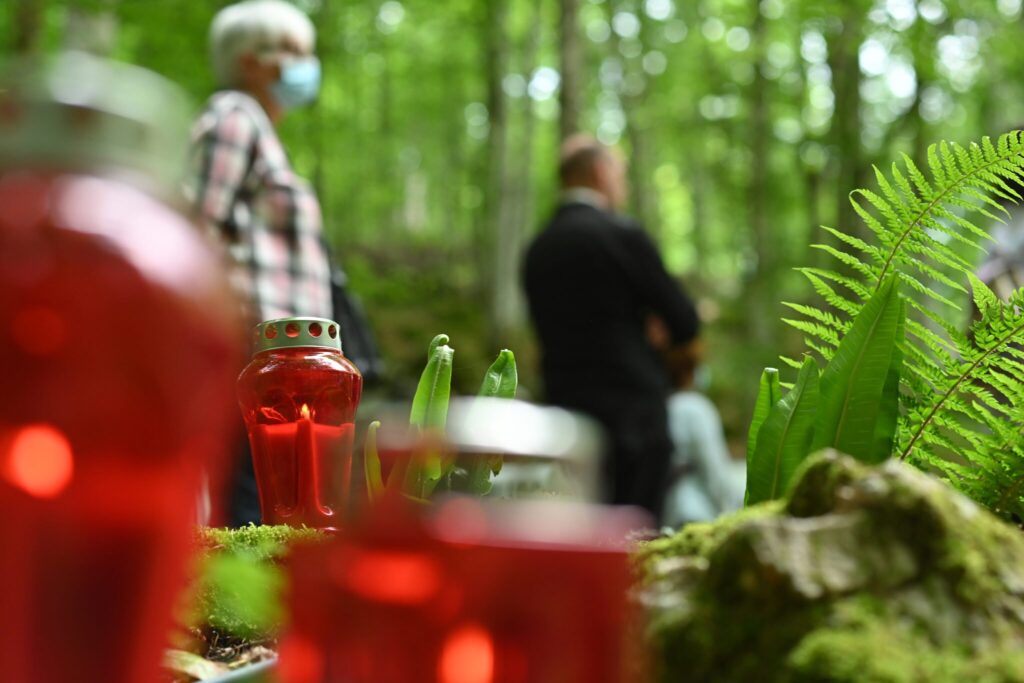The New Slovenian Covenant (Nova slovenska zaveza) was disappointed with the decision of the current government to abolish the national Day of Remembrance for the Victims of Communism and has thus called on the state to formally acknowledge that “our dead once existed.” In a public appeal, they called on the state to establish a publicly accessible register of the victims of communist violence against Slovenians. They believe that it is not possible to be neutral towards a crime, as we actually condone it by refusing to admit it happened, and in this case, they note with anguish that by abolishing the remembrance day in question, the government is relativising and tacitly condoning the crimes of communism against Slovenians.
“The State should not only ensure the basic justice for all the deceased by entering them in the register of victims but also show them basic respect by officially recognising that these persons once lived and are now deceased,” the representatives of the New Slovenian Covenant wrote in a public message.
“We were sad to learn that the Government of the Republic of Slovenia has abolished the national Day of Remembrance for the Victims of Communism – the 17th of May, and thus repressively suppressed the public commemoration of the crimes of the revolution in Slovenian society,” the message began, explaining that this was a painful act that expressed “contempt for the Slovenians who were tortured and murdered by the communist partisans.” They believe that this is an insulting act, not only to the victims but also to the families of those affected, both at home and abroad, which is a further blow to them. They added that the government has thus belittled the victims, which can be dangerous. They believe that it is not possible to be neutral towards a crime, because we are condoning it by refusing to accept it. In this case, they noted with anguish that by abolishing Remembrance Day, the government is relativising and tacitly condoning the crimes of communism against Slovenians.
“On the occasion of the just-abolished national Day of Remembrance for the Victims of Communism, we, the citizens of Slovenia, in respect for the suffering and unjust death of these victims, note that with the current political authorities, no progress can be made towards condemning the crimes of the revolution as reprehensible acts, no step towards regretting these evils and towards the moral rehabilitation of the victims as innocent,” they wrote, calling on the state to demonstrate in action whether it is capable of at least a minimal, official acknowledgement that “our dead once existed: they should create a publicly accessible record of the victims of communist violence against Slovenians,” they wrote.
They believe that the burden of proving the death of a loved one should be shouldered by the state and thus also be done by the state itself as part of its official duties, as many victims do not even have relatives. They called on the state not only to provide the deceased with elementary justice, but also to show them basic respect by officially recognising that they once lived and are now deceased.
The Republic of Slovenia has a legal obligation to do that
They also stated that the Republic of Slovenia has a legal obligation to do just that, among other things, under the “Act Ratifying the International Convention for the Protection of All Persons from Enforced Disappearances”, which entered into force on the 20th of November 2021. In the legal language of the convention in question, revolutionary killings are the cause of the enforced disappearances of thousands upon thousands of persons, which the convention defines as a crime that the state must investigate and officially report on. Victims of enforced disappearances also have the right to moral satisfaction: the State must provide for their “(b) rehabilitation; (c) satisfaction, including restoration of dignity and respectability” (Article 24).
“Just as the victims of Nazism in cultural nations are deeply regretted by all – by all professions, by all political orientations, by old and young; so, too, we must reach the point of regretting the victims of communism by old and young, by people of all political orientations and all professions. This is how the evil of history will be overcome,” they believe, and they appealed to the government “to think of all Slovenians and to stop the destructive slide into tolerating crime. The country of Slovenia should take the first step towards this by keeping a public record of the victims of communist violence. Although there are many more victims, we are hereby handing over to the state the list of 14,901 persons killed, which has been recorded in the book Memorial Plaques in Fara I-III,” they concluded.
Ana Horvat


